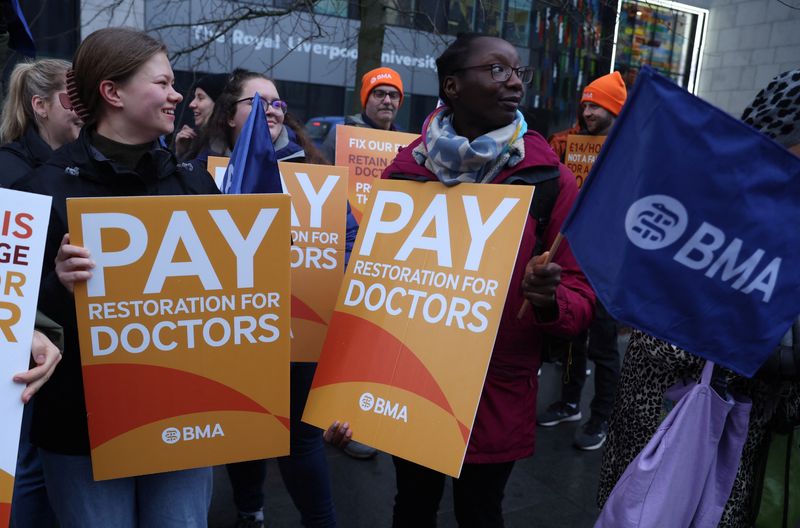Junior Doctors in England to Go on Strike Over Pay Dispute
Junior doctors across England are set to walk out on strike from July 25 to July 30, as revealed by their trade union. This decision comes after the British government failed to meet their demands for a more substantial pay increase this year. The move has sparked concerns about the potential impact on hospital services and patient care.
The co-chairs of the British Medical Association’s (BMA) resident doctors committee issued a statement highlighting that without a credible offer to restore their pay to previous levels, the junior doctors have no alternative but to take industrial action. This development marks a significant escalation in the ongoing dispute between medical professionals and the government.
Pay Offer Falls Far Short of Demands
The junior doctors, often referred to as resident doctors, have been offered an average pay rise of 5.4% by the government. However, this figure is seen as inadequate given the years of salary erosion when adjusted for inflation. The BMA argues that a much higher increase—around 29%—is necessary to bring their wages back to a fair level.
This situation follows a previous agreement where junior doctors accepted a 22% pay rise covering the period from 2023 to 2025. This deal ended months of previous strikes and was seen as a temporary resolution to the pay disputes. However, the current standoff suggests that the issues remain unresolved, with the latest offer failing to address the long-term financial challenges faced by medical staff.
Impact on NHS Services
The upcoming strikes threaten to disrupt thousands of appointments and procedures at hospitals across the country. This timing is particularly concerning as the government has recently claimed that it is making progress in improving services within the state-funded National Health Service (NHS). The disruption caused by the strikes could undermine these efforts and lead to further strain on an already overburdened healthcare system.
The BMA has stated that they met with Health Secretary Wes Streeting on Wednesday. Despite these discussions, the government has indicated that its focus remains on addressing non-pay aspects of doctors’ work. Streeting expressed disappointment in the threat of further strike action, stating that the government cannot “go further” on pay this year.
Ongoing Negotiations and Future Outlook
The government’s stance on pay remains a key point of contention. While the BMA continues to push for better financial terms, the government appears unwilling to compromise on this issue. This impasse highlights the broader challenges in negotiating fair working conditions and compensation for healthcare professionals.
The situation underscores the need for a comprehensive approach to resolving the pay disputes. It is essential for both parties to find a middle ground that ensures the sustainability of the NHS while also recognizing the contributions and sacrifices made by medical staff.
As the strike dates draw closer, the healthcare sector and the public will be closely watching the developments. The outcome of these negotiations could have far-reaching implications for the future of the NHS and the working conditions of its staff.







